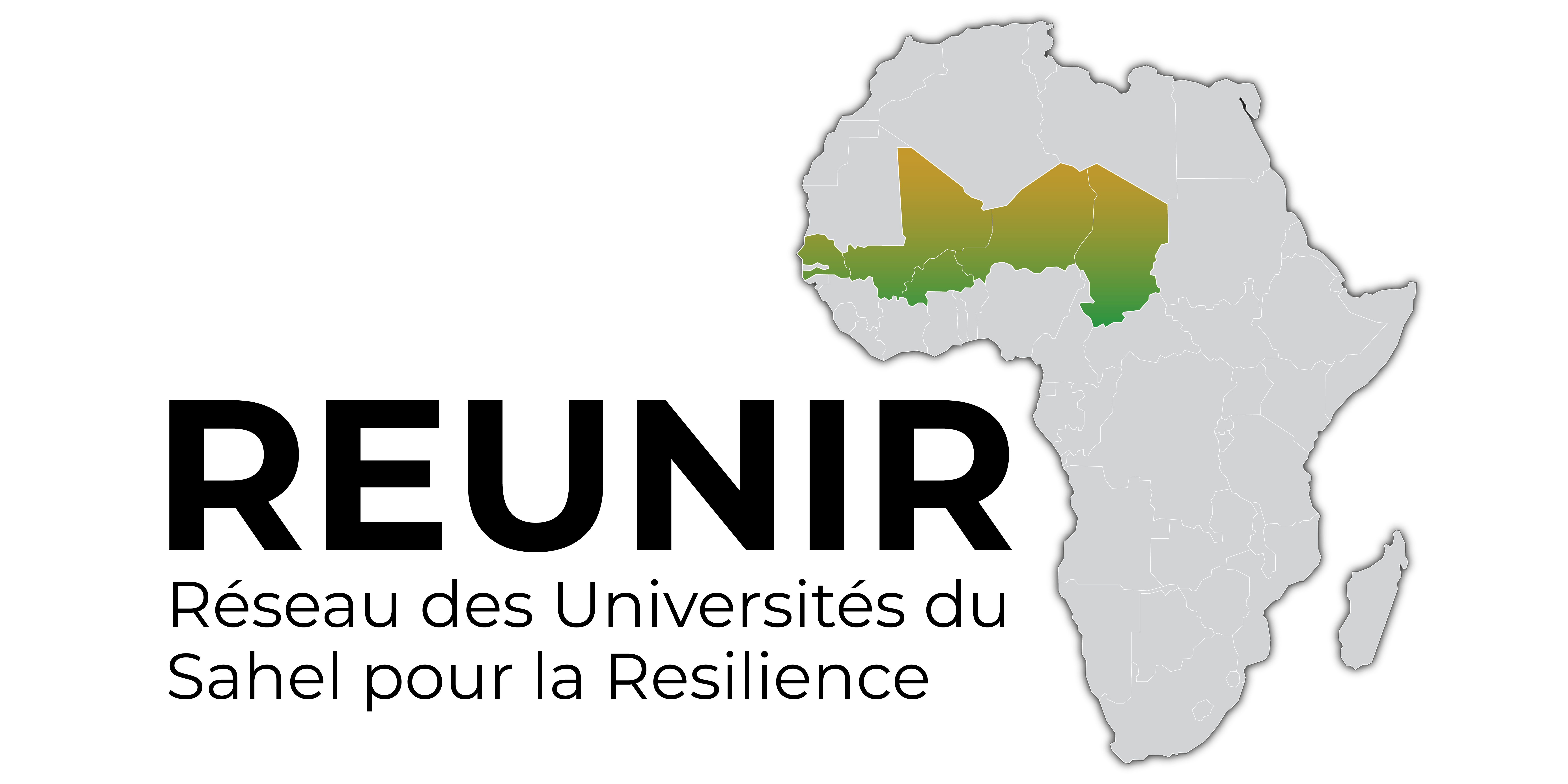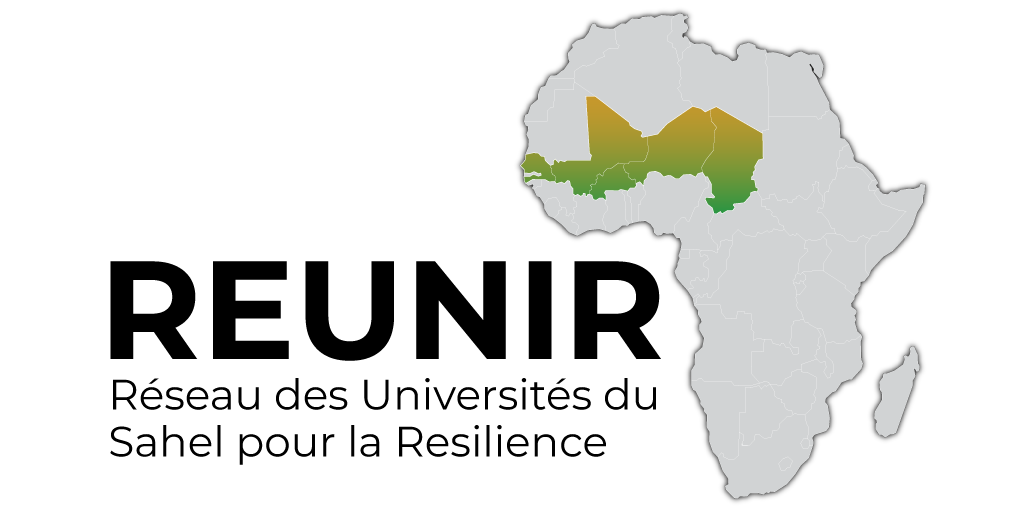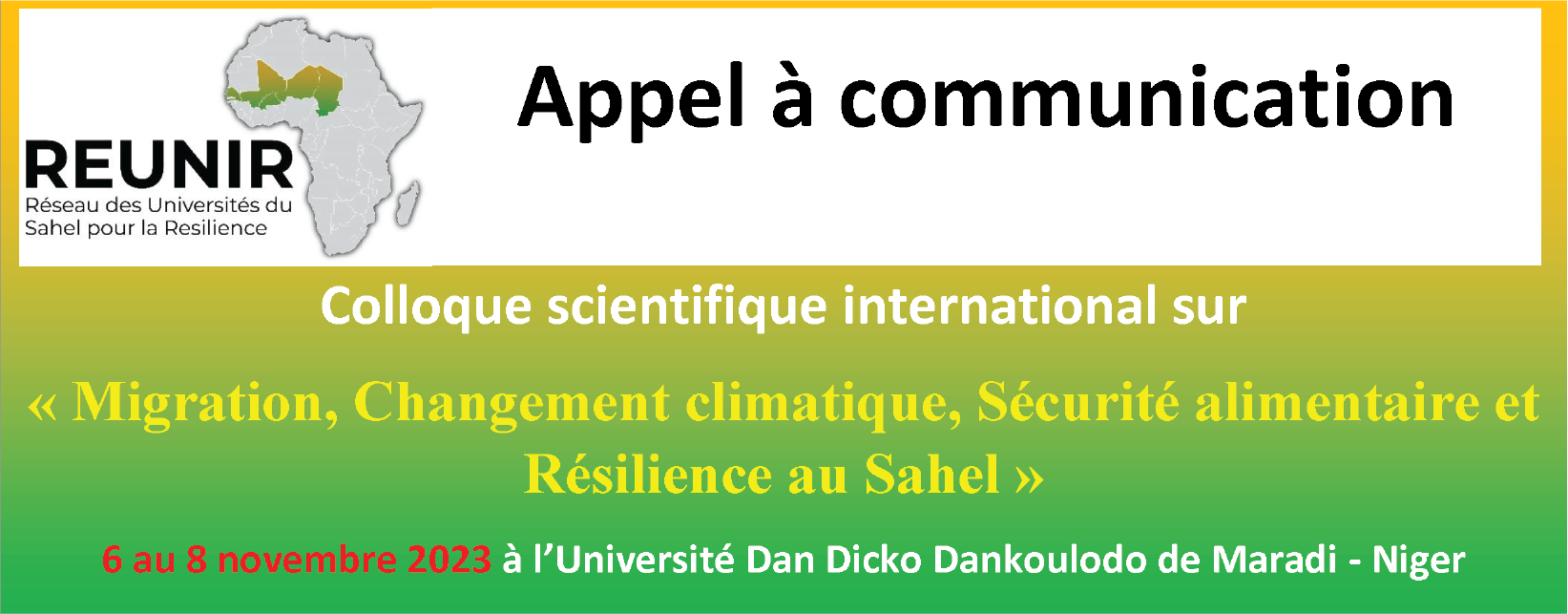Introduction
The Sahel region is repeatedly confronted with problems of food and nutritional insecurity, degradation of natural resources, consequences of climate change and poverty. In short, it is the part of the world which has experienced, over the last decade, the greatest increase in hunger despite the mobilization and intervention of a diversity of actors to provide food aid to the most vulnerable. .
Following the multiple successes recorded within the framework of scientific partnership agreements between the World Food Program (WFP) and six (6) higher education and research institutions in the Sahel, namely the Nazi BONI University (Burkina Faso), the Gaston BERGER University (Senegal), Abdou MOUMOUNI University (Niger), Dan Dicko DANKOULODO University of Maradi (Niger), University of N'Djamena (Chad) and the Rural Polytechnic Institute of Training and Research Applied (Mali), the latter decided to unite their efforts within a network. This commitment resulted in the creation in January 2020 of the Network of Sahel Universities for Resilience (REUNIR).
REUNIR aims to be a support and decision-making tool in the areas of resilience to food and nutritional insecurity, climate change and natural disasters in the Sahel. Initially composed of six (6) universities, REUNIR will have 11 universities during this year 2023 with the membership of the University of Fada N'Gourma (Burkina Faso), the University of Ségou (Mali), the University of Diffa (Niger), Amadou Moctar Mbow University (Senegal) and the University of Abéché (Chad).
In accordance with its objectives and as part of the implementation of its 2023 action plan, the Network of Sahel Universities for Resilience (REUNIR) is organizing an international scientific conference in November on questions of Migration, Climate Change, Food Security and Resilience at Dan Dicko Dankoulodo University in Maradi, Niger.
I. Context and justification for holding the conference
The Sahel region is characterized by spatio-temporal disparities in climatic characteristics which influence livelihoods, particularly agrosylvopastoral and fisheries production. This is due to the fact that the Sahel countries are in a situation of almost permanent extreme vulnerability, linked to droughts, pest attacks, continued land degradation and progressive desertification of the natural environment.
For several decades, the Sahel region has seen a sharp increase in the number of people experiencing food insecurity. More than 6 million children under the age of 5 are considered malnourished. The human development index of the Sahel countries is among the lowest in the world, the level of poverty is very high with low participation of women in economic activities and low access to basic social services.
Beyond food issues, other social challenges, including growing insecurity and the phenomenon of migration with a significant number of refugees and internally displaced people, are negatively impacting the Sahel. Growing insecurity, a corollary of the worsening conflict situations in the Sahel and the difficulties linked to the care of more than half a million people displaced within their own countries, provides the means to existence of communities.
Thus, the major issue which justifies the holding of this conference is to create the conditions for in-depth reflection around the major challenges which undermine the development process and the construction of the resilience of Sahelian communities and ecosystems.
- Challenges linked to the migration phenomenon
Migration is defined as any movement of individuals from their usual living environment to other horizons, which can be family or individual, temporary or permanent, professional, forced or voluntary. It is a universal phenomenon based on the search for a better life.
The migration issue today constitutes one of the subjects of debate at all levels. It is estimated that around 8.4 million migrants are leaving West Africa for various destinations, mainly Europe.
Various sources today consider sub-Saharan Africa to be particularly exposed to climate change and its various consequences (IPCC, 2014). The effects of climate change, which result in the irregularity of precipitation, the degradation of agricultural land, the drying up of ponds, the disappearance of plant cover, are at the origin of the massive displacement of populations towards areas where they can carry out their activities.
The phenomenon of migration, especially in the Sahel countries, is very worrying with the intensification of massive forced migrations, both internal and cross-border, having as main causes insecurity, famine, extreme poverty, etc. Indeed, for more than a decade, the Sahel region has been plagued by growing insecurity linked to the actions of terrorist groups operating in the sub-region and to intercommunity conflicts (farmers-breeders).
In an analysis of migration issues in West Africa, Van der Land et al. (2018) highlighted the importance of circular migration and the consequences of remittances on adaptation capacities and resilience. Environmental factors are therefore not the only variables to study in making the decision to migrate. Research and future reflections must enlighten us on broader approaches that take into account the heterogeneity of West African contexts.
- Challenges related to food and nutrition security
For around four decades, extreme weather conditions have continually pushed millions of people into acute food insecurity across sub-Saharan Africa. Climate-induced shocks to the food system now strike approximately every 2 years, and are even almost permanent in places. Under these conditions, farms in these countries or regions have no possibility of recovery as the shocks approach. This therefore means that to overcome food difficulties more quickly, it is necessary to invest in the resilience of communities and ecosystems. According to the United Nations, in Africa, up to 65% of productive land is degraded and 45% of land is affected by desertification. This desertification leads to a decline in soil fertility and land available for grazing. In a joint statement at the annual meeting of the Network for the Prevention of Food Crises in West Africa (RPCA) held in Lomé in December 2022, the Food and Agriculture Organization of the United Nations (FAO) , the United Nations Children's Fund (UNICEF) and the World Food Program (WFP) have sounded the alarm.
Indeed, these organizations highlighted that the number of people suffering from hunger in West and Central Africa is expected to reach a historic record of 48 million, including 9 million children next year if urgent and lasting solutions are not found. not brought. According to the latest results of the Harmonized Food Security Analysis Framework, more than 35 million people (including 6.7 million children) in the region, or approximately 8% of the population assessed, are currently unable to meet their needs. basic food and nutrition.
It is not enough for populations to have food products at their disposal, but a nutritionally balanced diet is necessary, especially for children aged 0 to 5 years. Malnutrition, in its acute form, is often very widespread in these countries. The causes are social, cultural and behavioral, but this malnutrition is aggravated by the growing and widespread insecurity in the Sahel countries. To meet this challenge, there is an absolute need to mobilize scientific skills to support the development strategies of these States.
In addition, African countries in general and those in the Sahel in particular are affected by global shocks that undermine food systems, including volatility in commodity markets, increases in energy and fertilizer prices, disruptions to international trade and ongoing events in Ukraine. These shocks have led to sharp increases in food prices across the region and worsened food insecurity, with this inflation straining meager household incomes and threatening the resilience of communities. All indicators show that it is urgent to find lasting solutions to ensure future generations have a productive land capable of meeting their needs.
- Challenges linked to Climate Change
Developing countries, particularly the Sahel countries, are vulnerable to the harmful effects of climate change. This exposure is manifested by a continuous increase in temperatures, a strong spatiotemporal variability of rainfall, accompanied by an increase in extreme events on a planetary scale. All the reasons for the increase in temperatures may not yet be known, but the main reason is due to the enormous quantities of greenhouse gases (GHGs) released into the atmosphere linked to activity. of man (Industries, agriculture, livestock, transport etc.). It is in fact admitted that climate change is difficult to reverse in the medium term.
II. Objectives of the International Scientific Conference
This conference aims to mobilize Teachers-Researchers, Researchers, Doctoral Students, Development Actors and communities to support the construction of peace and sustainable development in the Sahel. The work will be structured around the main theme: “Migration, Food Security, Climate Change and Resilience in the Sahel: What contributions does scientific research make to sustainable peace and development? ".
The main objective is to make proposals for tools and intervention strategies to achieve sustainable resilience of populations and ecosystems.
Specifically, this will involve analyzing:
- the impacts of climate change and agrosylvopastoral and fishing practices in the Sahel and environmental risks;
- the causes, issues and consequences of migration and food insecurity in the Sahel;
- the causes, issues and consequences of migration and food insecurity in the Sahel;
- systems and/or approaches for managing cross-border migratory flows.
III. Organization of the international scientific conference
The international conference will last three (3) days. An inaugural conference will focus on the sustainable development issues in the Sahel – issues and challenges. Then five panels will be organized on the following sub-themes:
- Panel 1: Food and nutritional security, migration and sustainable development in the Sahel;
- Panel 2: Climate change and agrosylvopastoral and fisheries practices;
- Panel 3 : Natural resource governance and sustainable land management for resilience;
- Panel 4: Systems and approaches for sustainable management of migration flows;
- Panel 5: Round table discussion on research, development issues and resilience.
Placed under the patronage of the Minister of Higher Education and Research, the conference will be organized by the Network of Sahel Universities for Resilience (REUNIR). It will be held from November 6 to 8, 2023 at Dan Dicko Dankoulodo University in Maradi, Niger.
IV. Résultats attendus du Colloque
At the end of the Conference, the following results are expected:
- The causes, issues and consequences of migration phenomena in the Sahel are analyzed;
- Systems and/or approaches for managing cross-border migratory flows are analyzed;
- The mechanisms for good governance of natural resources and building resilience are analyzed;
- Current issues and challenges related to food and nutritional security are analyzed;
- The impacts of climate change and environmental risks are assessed;
- The impacts of good practices in sustainable land management and resilience are known ;
- A final declaration on the proposed strategies and recommendations for managing the various crises is developed and disseminated.
V. Scientific Committee of the Conference
An international scientific committee composed of researchers and teacher-researchers from REUNIR member universities has been set up. Its task is to receive draft communications, select and evaluate article manuscripts after pre-evaluation by reading committees. Validated communications will be published in the form of conference proceedings.
VI. Format of the international scientific conference
This Conference will be a framework for exchanges, sharing of research results but also a moment of great reflection that could lead to proposals for strategies for managing the various challenges that are hampering the development of the Sahel countries. It will take place in a hybrid format (face-to-face and virtual) to facilitate the participation of communicators. The conference will take place in french and in English and the sessions will be led by high-level scientists and experts. All communications will be published in the form of conference proceedings. The conference will be the subject of a final declaration which will be available in French and English.
VII. Conditions of participation
The international conference is open to researchers, doctoral students, teacher-researchers, and experts from non-governmental organizations, private or public structures after registration and submission of their communication for one of the four sub-themes of the panels presented above .
VIII. Submission of communications
The summary : it must be succinct (250 words maximum), attractive and structured into problem/objective, materials and methods, main results/discussion and five (05) key words maximum.
The summary must be provided in French and English, and must contain on one page, the first name(s) and last name(s) of the author(s) and the full address(es), professional status and parent institution. Authors should submit their manuscripts to the following email address: mailto:reunir@u-naziboni.bf , only complete articles will be processed. Texts must be in Times New Romanian, font 12, single spaced. Participants and experts who intend to submit papers for the international conference must respect the deadlines indicated in the table below.
Table: the different deadlines
| Activité | Période |
| Launch of the call for applications | July 15, 2023 |
| Submission of abstracts | 1er as of August 30, 2023 |
| Notification of acceptance | September 15, 2023 |
| Full article submission | September 15, 2023 |
| Participation registration | September 15, 2023 |
| Holding of the international conference | November 6 to 8, 2023 |
| Publication of the conference proceedings | December 2023 |
NB : Registration for the conference is subject to payment of the registration fee:
- Teachers, Researchers and Researchers : 30 000 F CFA
- Members of NGOs and other organizations : 30 000 F CFA
- Doctoral students: 15 000 F CFA



